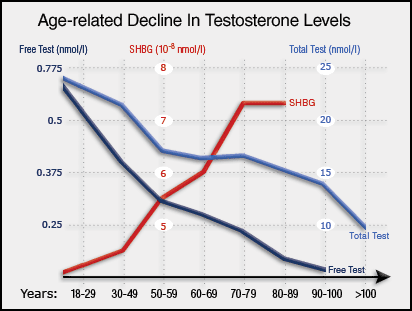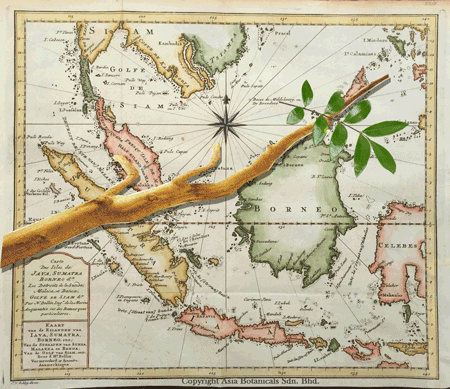Male Hormonal Health and the Role of Eurycoma longifolia Herb in Enhancing Free Testosterone in Ageing Men
Summary of points:
- Having lower than normal testosterone for ones age can contribute to many conditions of poor health.
- While testosterone does decline naturally with age there are several other factors that reduce the level of free testosterone (also known as bioavailable testosterone) and these are under our control.
- Tongkat Ali (Eurycoma longifolia) is the most important natural herb available today to increase free testosterone and scientific research over the past 20 years confirms this.
While testosterone production gradually declines after age 30 there are other factors under our control that further lowers usable testosterone and negatively influences our health. By understanding and treating these we can reduce our biological age as opposed to our chronological age. Common symptoms of low testosterone include; low libido, erectile dysfunction, weight gains, loss of muscle mass, pessimism, depression, irritability, fatigue, poor memory, sleep problems and a higher incidence of cardiovascular disease, heart attacks, prostate enlargement and cancer, osteoporosis and senile dementia.
 Studies have noted that testosterone levels and sperm count have been declining in many parts of the world as a result of poor diets, stress and sedentary lifestyles combined with rising estrogen exposure in foods and the environment. testosterone also becomes bound to serum globulin and is not available to the cell receptor sites where it is needed to initiate sex-stimulating centers in the brain. The component in the blood that renders free testosterone inactive is called sex hormone binding globulin (SHBG). Aromatase an enzyme produced in skin, fat tissue, brain & adrenals also converts testosterone into estrogen (estradiol), further educing available testosterone. While normal in small amounts, aromatization is accelerated with excess abdominal belly fat. For testosterone to produce its positive health enhancing effects, it must be kept in the "free" form in the bloodstream. Bound testosterone is unable to be picked up by testosterone receptors on cell membranes. Estrogen levels of the average 54-year-old man are often higher than those of the average 59-year-old woman. While some estrogen is a necessary hormone for men, too much contributes to a wide range of health problems, such as excess weight gains and prostate enlargement. Due to similarities in chemical structure, high serum levels of estrogen also trick the brain into thinking that enough testosterone is being produced, thereby slowing the natural production of testosterone. The testosterone level may also be affected unknowingly by various medications and alcohol.
Studies have noted that testosterone levels and sperm count have been declining in many parts of the world as a result of poor diets, stress and sedentary lifestyles combined with rising estrogen exposure in foods and the environment. testosterone also becomes bound to serum globulin and is not available to the cell receptor sites where it is needed to initiate sex-stimulating centers in the brain. The component in the blood that renders free testosterone inactive is called sex hormone binding globulin (SHBG). Aromatase an enzyme produced in skin, fat tissue, brain & adrenals also converts testosterone into estrogen (estradiol), further educing available testosterone. While normal in small amounts, aromatization is accelerated with excess abdominal belly fat. For testosterone to produce its positive health enhancing effects, it must be kept in the "free" form in the bloodstream. Bound testosterone is unable to be picked up by testosterone receptors on cell membranes. Estrogen levels of the average 54-year-old man are often higher than those of the average 59-year-old woman. While some estrogen is a necessary hormone for men, too much contributes to a wide range of health problems, such as excess weight gains and prostate enlargement. Due to similarities in chemical structure, high serum levels of estrogen also trick the brain into thinking that enough testosterone is being produced, thereby slowing the natural production of testosterone. The testosterone level may also be affected unknowingly by various medications and alcohol.
For aging men, it may be desirable to initiate lifestyle and supplementary regimes to reduce excess levels of SHBG and estrogen while boosting free testosterone. Testosterone levels are supported by regular exercise (especially resistance or weight training exercise), reducing weight with diets that reduce all refined carbohydrates and processed junk foods and specific foods and herbal supplements that promote free testosterone and counter the conversion of Testosterone to Estrogen (see our dietary recommendations here). A professional health regime must also supports adrenal function, blood sugar regulation, reduce inflammation and assist detoxification for maximum results.
The benefits of maintaining optimum testosterone levels are many, including;
- Improve muscle mass and strength
- Decrease body fat
- Increase bone mineral density
- Thicken body hair and skin
- Improve sexual desire
- Boost energy
- Decrease irritability and depression
- Improve cognitive function and confidence
Tongkat Ali (Eurycoma longifolia) Medicinal Research
 Tongkat Ali is a small rain forest tree common to Malaysia, Borneo and northern Sumatra in Indonesia. The long taproot of the plant has been used traditionally by the many different indigenous people of the region for a wide variety of conditions, the most common being low sexual energy and fevers. The name Tongkat Ali in Malay means “Ali’s walking stick” in reference to its famed aphrodisiac properties. Beginning in 1993, scientists from various Universities and research institutes around Malaysian began conducting scientific trials to evaluate whether Tongkat Ali had any scientific basis for its reputed aphrodisiac and sexual enhancing effects. These various studies started to be presented at local biotechnology and medicinal plant seminars after 1994. In these early studies Tongkat Ali was tested both on its effects on cellular activity in the test-tube as well as studies on live animals. These landmark studies on the effects of Tongkat Ali on living cells in the test-tube showed an increased rate of glycolysis (60% increased), an increase in ATP production (80%) observed in liver homogenates and an increase in cGMP and cAMP by 60% (this effect was compared to the action of sildenafil citrate or Viagra and was found to be similar). These results showed that cellular energy was significantly enhanced.
Tongkat Ali is a small rain forest tree common to Malaysia, Borneo and northern Sumatra in Indonesia. The long taproot of the plant has been used traditionally by the many different indigenous people of the region for a wide variety of conditions, the most common being low sexual energy and fevers. The name Tongkat Ali in Malay means “Ali’s walking stick” in reference to its famed aphrodisiac properties. Beginning in 1993, scientists from various Universities and research institutes around Malaysian began conducting scientific trials to evaluate whether Tongkat Ali had any scientific basis for its reputed aphrodisiac and sexual enhancing effects. These various studies started to be presented at local biotechnology and medicinal plant seminars after 1994. In these early studies Tongkat Ali was tested both on its effects on cellular activity in the test-tube as well as studies on live animals. These landmark studies on the effects of Tongkat Ali on living cells in the test-tube showed an increased rate of glycolysis (60% increased), an increase in ATP production (80%) observed in liver homogenates and an increase in cGMP and cAMP by 60% (this effect was compared to the action of sildenafil citrate or Viagra and was found to be similar). These results showed that cellular energy was significantly enhanced.
The next step was to investigate the effects on human testicular cells and testosterone synthesis (J.M. Saad et al 1995). The interesting results showed that Tongkat Ali extract significantly improved testosterone levels, while the dehydrotestosterone, also known as the bad testosterone (as it is implicated in prostate enlargement and male pattern baldness) was reduced.
Further studies by J.M. Saad et al, on testosterone synthesis in mice, rats and rabbits demonstrated an impressive 320 to 479% increase in testosterone levels. In another study around this time Tongkat Ali extract was given to both male and female mice to determine the effects on mounting and litter size. While this test showed an increase in mounting frequency and testicular size increase in the male rats, what was interesting also was that the litter size increased by up to 76% with an increases ratio of male to female offspring, from the norm of 1:1 to 3:1.
From this and other subsequent studies it was shown that Tongkat Ali consumed orally significantly improved all aspects of sperm quality including volume and motility. Its fertility enhancement effects of Tongkat Ali extract was due to its effect of increasing sperm concentration, motility and velocity of movement, thus helping to increase the chances of sperms to penetrate the ova. As such a higher rate of fertilization causes an increase in offspring number. Also the capability of the extract to enhance energy production helps to increase the percentage of embryo development and increase the amount of embryo surviving up to the blastocyst stage.
It was however only in 1997 that studies on Tongkat Ali’s aphrodisiac effect were published in international scientific journals. This was achieved as a result of the studies conducted by the research team at University Science Malaysia (USM), principally Dr. Ang Hoi Hoon, with Tongkat Ali on rats and for the next 8 years or so they would go on to publish 1 or 2 studies each year, evaluating the aphrodisiac properties of Tongkat Ali.





